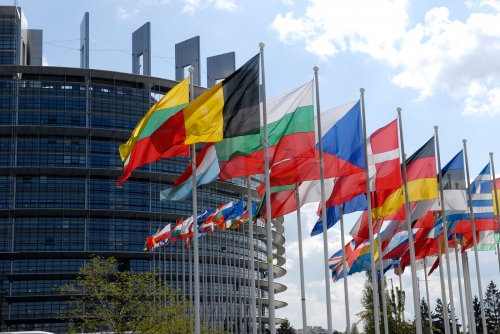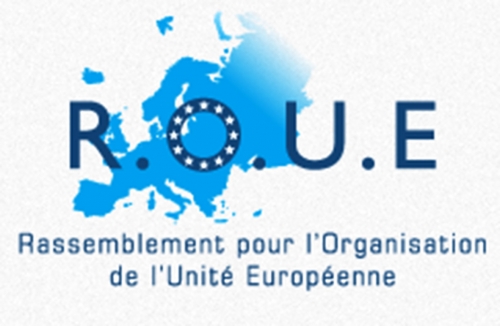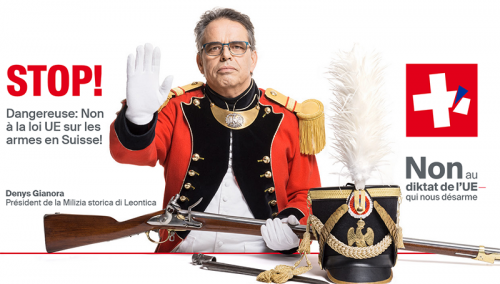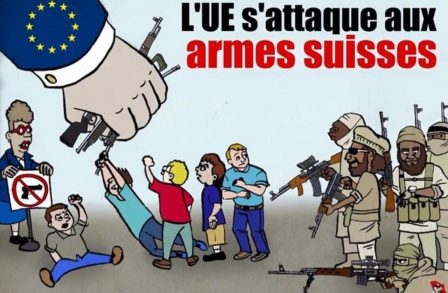Translated by Guillaume Durocher
Ex: http://www.counter-currents.com
Translator’s Note: The following extracts are drawn from Taisen Deshimaru, Zen et Arts martiaux (Paris: Albin Michel, 1983 [1977]). The style reflects the rambling, spontaneous speaking of many Zen masters, whose “writings” are often not of their own initiative, but rather sayings recorded by their pious (often Western) followers. Another example of this would be Shunryū Suzuki, who was popular in California. This does raise the question of how “Taisen Deshimaru” authored the books ascribed to him. Deshimaru’s French was poor and his English a tolerable “Zenglish.” The particular French language used then must be the product of his followers. Still, as with all foundational spiritual texts, whatever the relationship with the founder himself, the words are a genuine reflection of his school or movement, and, in this case, of an authentically Francophone and European Zen.
Is there not a Way which would allow man to surpass the limits of his humanity? To go beyond?
It was to answer this fundamental hope that Budo[1] [2] produced the principle of wasa. One can define a wasa as an art, as a kind of super-technique passed on from master to student, enabling one to impose oneself on other man and to elevate oneself above them. The wasa of Japanese Budo goes back to the historical age of the samurai. It is a power, beyond the individual’s own strength.
Zen, for its part, has created another super-technique, which not only grants physical and mental strength, but even opens the path to Wisdom, the path of a wisdom comparable to that of God or Buddha. This is zazen:[2] [3] a training in sitting down in a traditional posture, a training in walking, in feeling oneself standing up, in breathing correctly; a mental attitude, the hishiryo[3] [4] state of consciousness, a profound and unique education. (16)
* * *
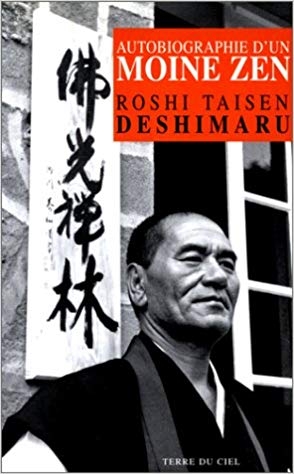 The Seven Principles
The Seven Principles
The fusion of Buddhism and Shintoism enabled the creation of Bushido, the Way of the samurai. One can sum up this Way in seven fundamental points:
- Gi: right decision in equanimity, the right attitude, truth. When we must die, we must die.
- Yu: bravery with shades of heroism.
- Jin: universal love, benevolence towards humanity.
- Rei: right behavior, which is a fundamental point.
- Makoto: total sincerity.
- Melyo: honor and glory.
- Chugi: devotion, loyalty.
These are the seven principles of the spirit of Bushido. Bu: martial arts. Shi: the warrior. Do: the Way.
The way of the samurai is imperative and absolute. The practice coming from the body via the unconscious is fundamental. Hence the very great importance assigned to education in right behavior.
The influences between Bushido and Buddhism have been reciprocal. But Buddhism was influenced by Bushido in five respects:
- The calming of sentiments.
- Tranquil obedience in the face of the inevitable.
- Self-mastery in the presence of any event.
- Greater intimacy with the idea of death than with that of life.
- Pure poverty.
Before the Second World War, Zen Master Kodo Sawaki gave lectures to the greatest martial arts masters, to the highest authorities of Budo. In French, we confuse martial arts and the arts of wars; but in Japanese the former is the Way. In the West, these martial arts, which are now fashionable, have become a sport, a technique, without the spirit of the Way.
In his lectures, Kodo Sawaki said that Zen and the martial arts have the same taste and are united. In Zen as in the martial arts, training counts for a lot. How long must one train? Many people have asked me: “How many years must I do zazen?” And I answer: “Until your death.” Then my conversation partners are not very happy. Europeans want to learn quickly, some even in a single day. “I’ve been once and I’ve understand,” so they say! But the dojo is different from University.
And Budo, too, one must continue up to one’s death. (20-21)
* * *
In the martial arts, one must penetrate the elements, the phenomena, and not miss the mark. The martial arts are then essentially virile, because man penetrates woman. But nowadays, everyone saves their energy and only half-lives. We are always incomplete. People half-live, tepid like bathwater. (31)
* * *
We must create our life, make ourselves free, detached, attentive only to the here and now: everything is there. (32)
* * *
To concentrate means the complete expulsion, the total discharge of energy. This must be found in all the acts of our life. In the modern world, we see just the opposite: the young half-live and are half-dead. And during their work or during zazen, they think of sex, and vice versa: it is like this in all the acts of life. (33)
* * *
One must channel the body’s tension and the technique’s skill into the mind’s mindfulness-intuition. The mind is then empty, ku,[4] [5] flawless. This is Zen. This is also the true way of Budo. In the face of death, as with life, the consciousness must be calm. And one must decide, all the while accepting, one’s life as much as one’s death. To not passively endure.[5] [6] Even if my body dies, my mind must remain upright: this is the training of Zen and Budo. (48)
* * *
In the spirit of Zen and Budo, daily life becomes a battlefield. Every moment one must be conscious, getting up, working, eating, going to sleep. Self-mastery is found here. (49)
* * *
You can use [controlled breathing] in your daily life. In a discussion, when you are getting emotion, practice it, and you will calm yourself. You keep your control. (53)
* * *
One must not bow any old which way: in the West, one vaguely joins the hands together and one bends the head down a bit; one has not understood anything about the gesture’s beauty! One must bow completely: join one’s hands together slowly, arms straight, parallel to the ground, the ends of the fingers coming to the nose’s height, then curving thus one’s back towards the ground, powerfully, to get back up with one’s hands still joined and putting the arms naturally along the body. Body upright, neck upright, feet on the ground, the mind calm. (In a majestic gesture, Taisen Deshimaru got up and bowed to us.) Thus you show the respect you have for your opponents, for your master, for the dojo, and for life! I am sometimes asked why I bow before the statue of the Buddha, in the dojo: I am not bowing to a wooden statue, but to all those who are here with me, in the dojo, and also to the entire cosmos. (55)
* * *
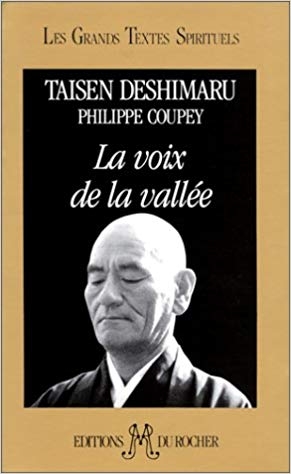 No one is normal today. Everyone is a bit mad, with their mind working all the time: they see the world in a narrow, impoverished way. They are consumed by their ego. They think they see, but they are wrong: they are projecting their madness, their world, onto the world. No lucidity, no wisdom in that! That is why Socrates, like Buddha, like all sages, first says, “Know yourself and you will know the universe.” That is the spirit of traditional Zen and Bushido! For this, the observation of one’s behavior is very important. Behavior influences consciousness. With the right behavior, there is the right consciousness. Our attitude here, now, influences the entire environment: our words, our gestures, our bearings, all this influences what happens around us and within us. The actions of every moment, of every day, must be right. The behavior in the dojo will spill over in your daily life. Every gesture is important! How to eat, how to get dressed, how to wash, to go to the toilet, how to put things away, how to behave with others, with one’s family, one’s wife, how to work, how to be completely in each gesture. One must not dream one’s life! But one must be completely in everything we do. This is training in the kata.[6] [7] The spirit of Zen and Buddha tends to this: they are true sciences of behavior. This has nothing to do with the imagination that transforms the world, as in many religions. One must live the world with one’s body, here and now. And completely concentrate on each gesture. . . . Modern civilization understands nothing of all this, from school onward we are cut off from life in order to do theory. (55-56)
No one is normal today. Everyone is a bit mad, with their mind working all the time: they see the world in a narrow, impoverished way. They are consumed by their ego. They think they see, but they are wrong: they are projecting their madness, their world, onto the world. No lucidity, no wisdom in that! That is why Socrates, like Buddha, like all sages, first says, “Know yourself and you will know the universe.” That is the spirit of traditional Zen and Bushido! For this, the observation of one’s behavior is very important. Behavior influences consciousness. With the right behavior, there is the right consciousness. Our attitude here, now, influences the entire environment: our words, our gestures, our bearings, all this influences what happens around us and within us. The actions of every moment, of every day, must be right. The behavior in the dojo will spill over in your daily life. Every gesture is important! How to eat, how to get dressed, how to wash, to go to the toilet, how to put things away, how to behave with others, with one’s family, one’s wife, how to work, how to be completely in each gesture. One must not dream one’s life! But one must be completely in everything we do. This is training in the kata.[6] [7] The spirit of Zen and Buddha tends to this: they are true sciences of behavior. This has nothing to do with the imagination that transforms the world, as in many religions. One must live the world with one’s body, here and now. And completely concentrate on each gesture. . . . Modern civilization understands nothing of all this, from school onward we are cut off from life in order to do theory. (55-56)
* * *
“What is the Buddha way?” It is to study the ego. “What is studying the ego?” To forget oneself. . . . “Do not think. Do not search. Do not desire. Do not hold yourself back. Do not obtain. Do not give up.” (66)
* * *
You must kill yourself, kill your own spirit. (69)
* * *
“The moon’s reflection in the river water does not move, does not flow. It’s only the water which is passing.” . . . If one wants to explain the relationships between spirit, consciousness, and the true self, it is exactly like the relationships between the Moon, its reflection, and the river water. (69-70)
* * *
In Budo, consciousness and action must always be a unity. At first, in aikido, kendo, etc., one repeats the wasa, the techniques, and the kata, the forms. One repeats them constantly for two or three years. The kata and wasa, the forms and techniques, also become a habit. At first to practice them, one must use one’s personal consciousness. It is the same in playing the piano, the drum, or the guitar, for example. At the end, it is possible to play unconsciously, without attachment anymore, without using the principles anymore. One can play naturally, automatically. It is possible to create something fresh by this wisdom. And it is the same in our daily life. This is Zen, the spirit of the Way.
The great works of art are created beyond technique. In the field of technology and science, the great discoveries go beyond principles and techniques. To be attached to only one idea, one category, one system of values, is a false conception, contrary to the laws of life and of the Way. (81)
* * *
If we only think about the result, the fruits [of our actions] with our personal consciousness, then we cannot concentrate nor evacuate our full energy. If we only make the make, the greatest fruits will then appear, unconsciously, naturally. Practice without consciousness is better than conscious practice. (83)
* * *
There need only be neither love nor hatred
For understanding to appear
Spontaneously clear
Like the light of day in a cave.
— From the Shin Jin Mei (Poem on Faith and Mind, 89)[7] [8]
* * *
[How can one exercise one’s ki?[8] [9]] By practicing zazen! (People laugh.) But also by training oneself in combat, in action. Today, children are too weak: modern education makes them weak, soft, ki-less. Master Obaku always educated with his kyosaku (staff) by striking great blows upon this follower who was too intelligent, asked too many questions, and always analyzed each situation with his conscious mind. (102-3)
* * *
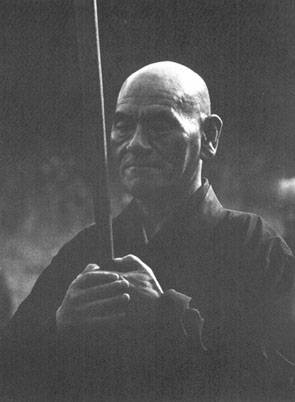
There is no reason to be afraid of anything. Those who are afraid are too selfish, think only of themselves. One must abandon one’s ego, then fear vanishes. When you always go against, fear arises. Even in a fight, one must have the same consciousness as one’s opponent and not go against, but with. This is a great koan.[9] [10]
One must become the situation and not differentiate oneself from it. A selfish being can never be brave, never. The true traditional education of the martial arts strengthens ki, destroys egoism and fear, makes one abandon the dualistic spirit, and develop mushin consciousness,[10] [11] which forgets the self.
No need to want to win; only then can one win.
To abandon the ego . . . That is the secret to the right life. The strengthening of the will, strength, and skill are necessary in life as in the practice of the martial arts. But to strengthen the spirit and find one’s freedom remain essential!
Mushin . . . nothingness. (103)
* * *
[Does the spirit remain?] Perhaps. I don’t agree with the Western theories which separate body and spirit. The spirit needs a form to realize itself, therefore a body. Also, if a body is dead, what we know under the name of spirit also dies, returns to the cosmic energy. Our ki, upon death, returns to the cosmos.
The real problem remains: where does all this come from? (105)
* * *
Another factor in the loss of ki, especially in modern civilization, is dispersion, mental agitation, anxiety, disordered thoughts: today, we use the frontal lobes too much, whereas one should develop the unconscious activity of the hypothalamus to strengthen the deep brain, intuition, instinct. And the lack of vital energy is making everyone sick: everyone is more or less sick today. (106)
* * *
To know how to concentrate is to put one’s ki, one’s vital energy, in one single action at a time.
Training in concentration means that, little by little, one knows how to concentrate on one thing at a time, but also to be conscious of everything which is happening around us. . . . In general, we need to fully concentrate in each situation. Here, now, I drink water; to only do this, to drink water. To concentrate on the water I drink. And so forth. No need to think too much! . . .
Concentration is acquired through training: to be concentrated on each gesture. To return to the normal state of the body and the mind. In the end, will plays no more role, it is done automatically, naturally, unconsciously. Without fatigue. Whereas with the will, the frontal lobes become tired, and with them, the entire being. During fights, the lower dan[11] [12] tire quickly because they are tense, always ask themselves what they should do, when to act, and so on. It’s the same thing for an actor who thinks about his role while acting, he is bad: he must live his role, that’s all, commit himself completely. . . . (107-8)
* * *
[What is the Way?] To look at one’s consciousness, here and now . . . and the Zen koan says: the Way is under your feet. (108)
* * *
[T]he martial arts ultimately aim to keep oneself alive in the face of contrary forces, whereas zazen resolves the question of death. I often say: practicing zazen is likely entering your coffin because, in the end, you abandon everything. . . . It follows that in being alive, we need to concentrate on life and the approach of death, we need to abandon life and know how to die. That is wisdom. But what is life, what is death?
Then, if we want to really live, we need to know death within oneself. Life is a succession of here-and-nows: one needs to constantly concentrate, in the here and now. People, who are worried by the future or the past, do not realize the illusion in which they live. One must resolve the contradiction in oneself, the contradiction carried by the brain itself. (108-9)
* * *
[What should I do when I am attacked? One cannot think of all these things at once.] Don’t think, of course! But react with wisdom. One must always be wise. If you are attacked by someone stronger than you and you really don’t feel you are up to size, it is better to flee! No need to get whooped! (People laugh.) Otherwise, one needs to fight. Without passion, with instinct, strength, and wisdom. (109)
* * *
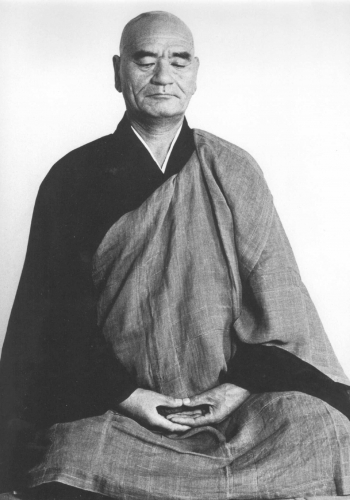
By reflecting on oneself, one can then see the imperfections of one’s karma and control the bonno,[12] [13] desires, and passions. And in this zazen is the great mirror to ourselves which allows us to improve ourselves. If in life there is no such practice which rebalances tendencies, we develop only a part of ourselves. One becomes, one way or another, too spiritualist or too materialist. That is the mistake of all of modern civilization and the cause of the current crisis. (110)
* * *
. . . understand that your life is nothing but a dream, a bubble, a shadow . . . Your death will come soon: never forget this from one moment of consciousness to another, from each breath in to each breath out. (118)
* * *
With a long experience, and thanks to the infinite merits of zazen, you will understand all this unconsciously . . . Nor is it from one day to the next that we will become sensitive to the goodness of the people with whom we live. On the Buddha-Way, you must always keep hope without ever tiring, whether this be in happiness or misfortune. . . .
It is within us that is found the root, the origin of life and death. (121)
* * *
If the mind is calm, the body can act spontaneously; action then becomes free and easy. If one always uses one’s conscious mind, the body is constrained in its action. (131)
* * *
Nowadays people are too chatty. When they talk, they only speak according to the result of the words, at a superficial level, to be polite, out of interest or competition. Human interrelations become complexity, worry, and pride. By the practice of zazen, we learn to have direct, natural ties, not influenced by our ego, and we also learn the merits of silence. (134)
* * *
“To study the Buddha-Way is to study oneself; to study oneself is to abandon the ego; to abandon to ego is to melt into the whole cosmos.” (136)
* * *
Cosmic energy is concentrated in the lower belly, and in particular in the genitals. Sexual energy, indeed, is the primary manifestation of this universal life in us, and enables the relationship between the life of the universe and individual life, between the world of phenomena and the invisible world of ku. . . .
Sexual energy during procreation enables the manifestation of the force (ki) of universal life in the phenomenal world. (137)
* * *
In Europe, the philosophers have tried to realize this fusion between mind and matter, but only at a superficial, purely intellectual level. (138)
Notes
[1] [14] The martial arts. The Way of the samurai, to be precise: bushido. Budo is the way of combat. But the kanji bu really means: to stop the sword, to stop using the sword, to cease fighting. [Unless otherwise indicated, footnotes are taken from Zen et arts martiaux’s Glossary. – GD]
[2] [15] Seated meditation. – GD
[3] [16] Thinking without thinking. Beyond thought.
[4] [17] Vacuity. Existence without a noumenon. In Buddhism, it also means: the Invisible. A notion identical with the notion of God.
[5] [18] For subir. – GD
[6] A “form” in Budo. All the martial arts – judo, kendo, aikido, etc. – have kata: forms, actions, training exercises aimed at winning. The beginners must learn the kata, internalize them, use them, and then create based on them, from this original and specific form unique to each of the martial arts.
[7] [19] Translated from the French. – GD
[8] [20] Invisible activity imbued with the energy of the cosmos. Becomes the energy of the body, in all its cells.
[9] [21] A Zen riddle, often apparently absurd. – GD
[10] [22] “Mind without mind,” a kind of detached activity, comparable to “flow.” – GD
[11] [23] A rank in Eastern martial arts. – GD
[12] [24] Illusions, attachments. – GD

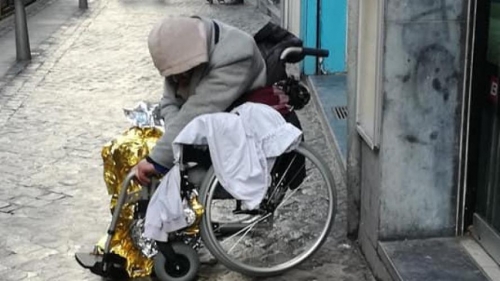
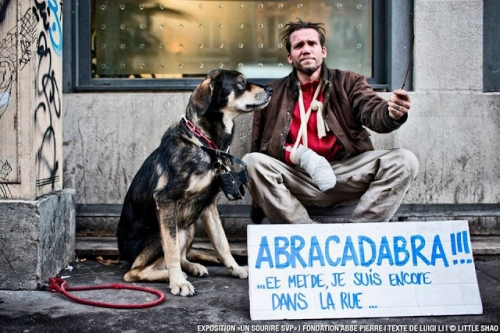



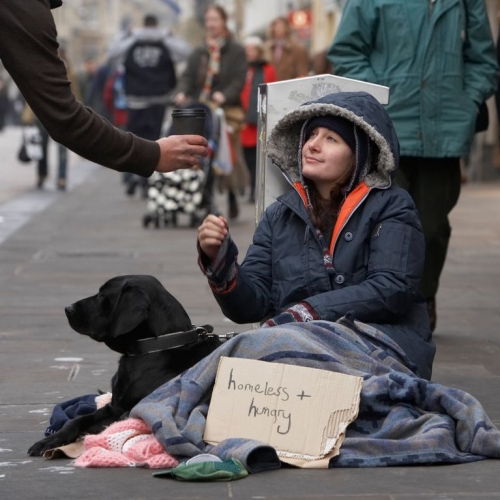

 del.icio.us
del.icio.us
 Digg
Digg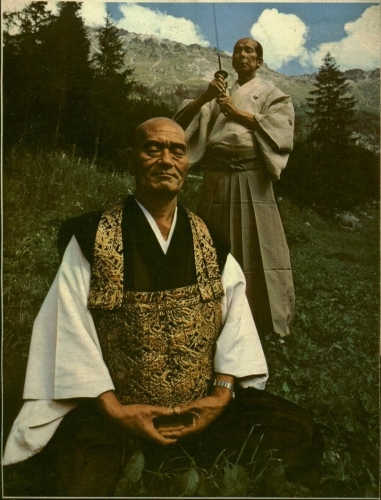
 The Seven Principles
The Seven Principles No one is normal today. Everyone is a bit mad, with their mind working all the time: they see the world in a narrow, impoverished way. They are consumed by their ego. They think they see, but they are wrong: they are projecting their madness, their world, onto the world. No lucidity, no wisdom in that! That is why Socrates, like Buddha, like all sages, first says, “Know yourself and you will know the universe.” That is the spirit of traditional Zen and Bushido! For this, the observation of one’s behavior is very important. Behavior influences consciousness. With the right behavior, there is the right consciousness. Our attitude here, now, influences the entire environment: our words, our gestures, our bearings, all this influences what happens around us and within us. The actions of every moment, of every day, must be right. The behavior in the dojo will spill over in your daily life. Every gesture is important! How to eat, how to get dressed, how to wash, to go to the toilet, how to put things away, how to behave with others, with one’s family, one’s wife, how to work, how to be completely in each gesture. One must not dream one’s life! But one must be completely in everything we do. This is training in the kata.
No one is normal today. Everyone is a bit mad, with their mind working all the time: they see the world in a narrow, impoverished way. They are consumed by their ego. They think they see, but they are wrong: they are projecting their madness, their world, onto the world. No lucidity, no wisdom in that! That is why Socrates, like Buddha, like all sages, first says, “Know yourself and you will know the universe.” That is the spirit of traditional Zen and Bushido! For this, the observation of one’s behavior is very important. Behavior influences consciousness. With the right behavior, there is the right consciousness. Our attitude here, now, influences the entire environment: our words, our gestures, our bearings, all this influences what happens around us and within us. The actions of every moment, of every day, must be right. The behavior in the dojo will spill over in your daily life. Every gesture is important! How to eat, how to get dressed, how to wash, to go to the toilet, how to put things away, how to behave with others, with one’s family, one’s wife, how to work, how to be completely in each gesture. One must not dream one’s life! But one must be completely in everything we do. This is training in the kata.

